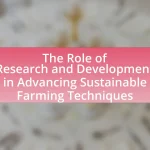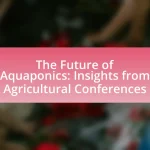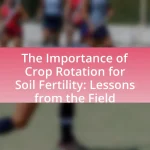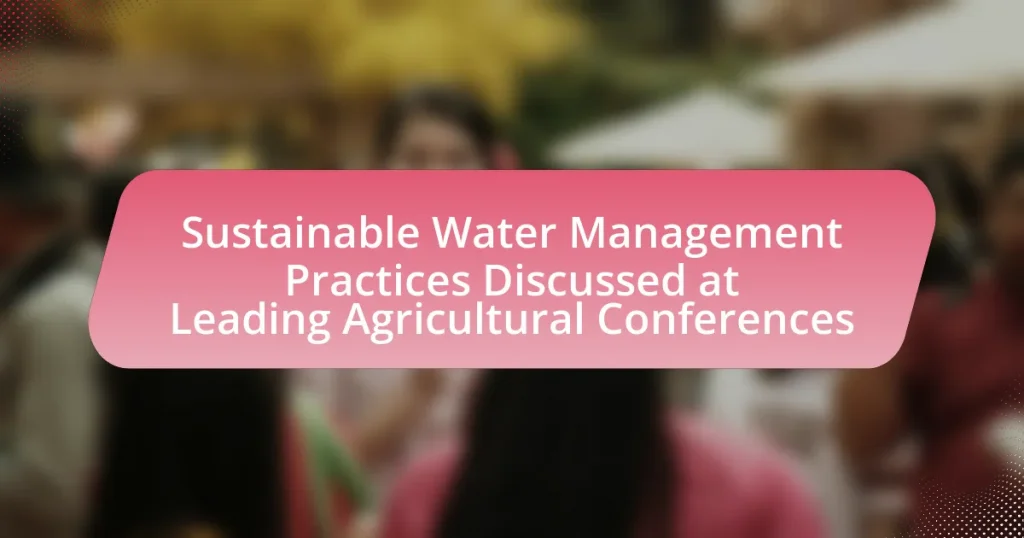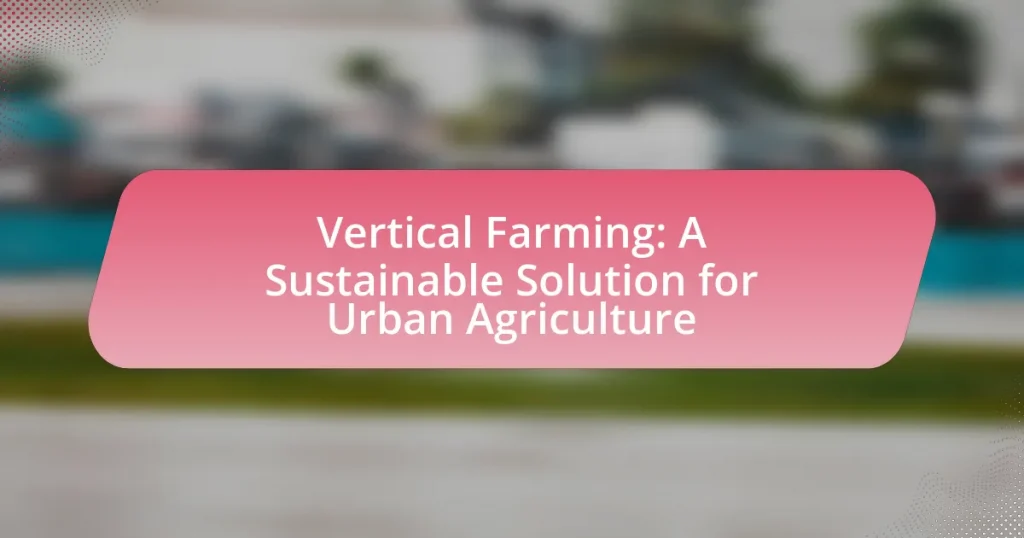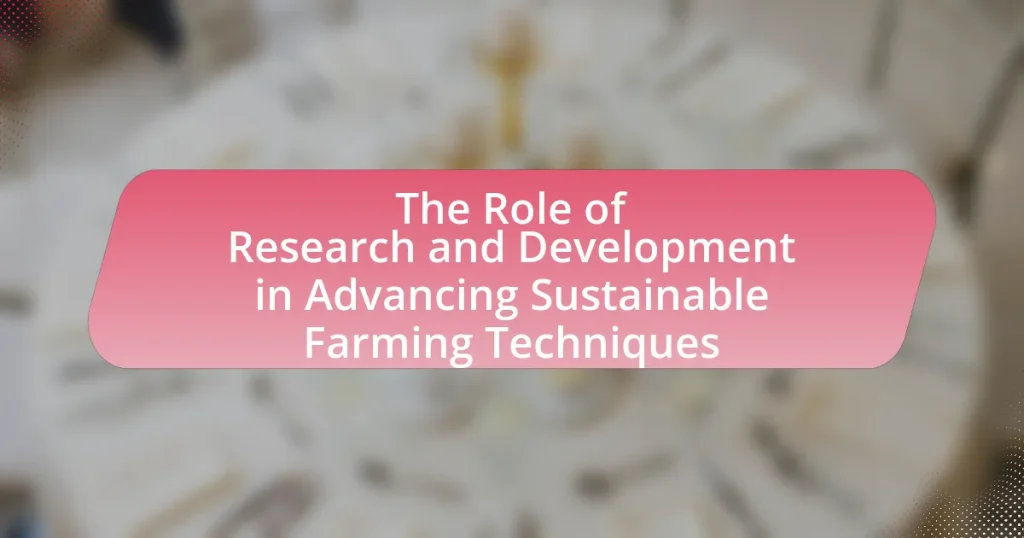Sustainable water management practices in agriculture are essential for optimizing water use while minimizing environmental impact. This article explores various techniques such as drip irrigation, rainwater harvesting, and soil moisture management, highlighting their effectiveness in conserving water and enhancing crop yields. It also addresses the challenges farmers face, including water scarcity and regulatory constraints, and discusses the role of innovative technologies and community engagement in promoting sustainable practices. Key components of these practices, recent trends, and successful case studies from agricultural conferences are examined to provide a comprehensive understanding of sustainable water management in agriculture.
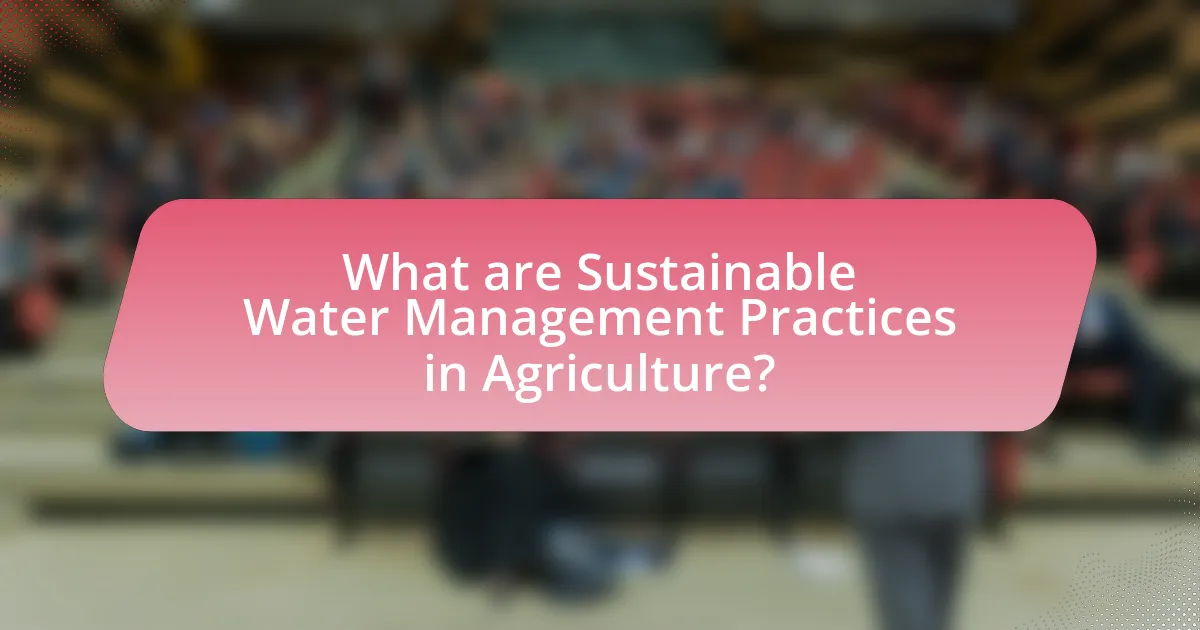
What are Sustainable Water Management Practices in Agriculture?
Sustainable water management practices in agriculture include techniques that optimize water use while minimizing environmental impact. These practices encompass methods such as drip irrigation, which delivers water directly to plant roots, reducing evaporation and runoff; rainwater harvesting, which captures and stores rain for agricultural use; and soil moisture management, which involves maintaining optimal soil conditions to enhance water retention. Research indicates that implementing these practices can lead to significant water savings; for instance, drip irrigation can reduce water usage by up to 60% compared to traditional irrigation methods. Additionally, sustainable practices contribute to improved crop yields and soil health, demonstrating their effectiveness in promoting both agricultural productivity and environmental sustainability.
Why are Sustainable Water Management Practices important for agriculture?
Sustainable water management practices are crucial for agriculture because they enhance water efficiency, ensuring that crops receive adequate hydration while minimizing waste. These practices help to conserve water resources, which is vital in regions facing water scarcity, as agriculture accounts for approximately 70% of global freshwater use. Implementing techniques such as rainwater harvesting, drip irrigation, and soil moisture management can significantly reduce water consumption and improve crop yields. Studies have shown that adopting sustainable practices can lead to a 30-50% reduction in water use while maintaining or increasing agricultural productivity, thereby supporting food security and environmental sustainability.
What challenges do farmers face regarding water management?
Farmers face significant challenges regarding water management, including water scarcity, inefficient irrigation practices, and regulatory constraints. Water scarcity is exacerbated by climate change, leading to reduced rainfall and increased competition for water resources. Inefficient irrigation practices, such as over-irrigation or reliance on outdated systems, result in water wastage and increased costs. Additionally, regulatory constraints can limit farmers’ access to water sources, complicating their ability to implement effective water management strategies. These challenges hinder agricultural productivity and sustainability, making it essential for farmers to adopt innovative water management practices.
How do these practices contribute to environmental sustainability?
Sustainable water management practices contribute to environmental sustainability by optimizing water use, reducing waste, and enhancing ecosystem health. These practices, such as rainwater harvesting and efficient irrigation techniques, minimize water consumption and prevent over-extraction from natural sources, thereby preserving aquatic ecosystems. For instance, implementing drip irrigation can reduce water usage by up to 60% compared to traditional methods, which helps maintain soil moisture and supports biodiversity. Additionally, these practices promote soil health and reduce runoff, leading to less pollution in waterways, which is crucial for maintaining clean water resources.
What are the key components of Sustainable Water Management Practices?
The key components of Sustainable Water Management Practices include efficient water use, water quality management, ecosystem protection, and stakeholder engagement. Efficient water use involves adopting technologies and practices that minimize water waste, such as drip irrigation and rainwater harvesting. Water quality management focuses on preventing pollution and ensuring safe water for consumption and agriculture, which is critical for public health and environmental sustainability. Ecosystem protection emphasizes maintaining natural water cycles and habitats, which support biodiversity and resilience against climate change. Lastly, stakeholder engagement ensures that all relevant parties, including farmers, policymakers, and communities, collaborate in decision-making processes, leading to more effective and equitable water management solutions. These components are essential for achieving long-term sustainability in water resources, as highlighted in various agricultural conferences that address the challenges and innovations in water management.
What technologies are utilized in sustainable water management?
Technologies utilized in sustainable water management include advanced irrigation systems, rainwater harvesting, water recycling and reuse, and smart water management systems. Advanced irrigation systems, such as drip and sprinkler irrigation, optimize water use by delivering precise amounts directly to plant roots, reducing waste. Rainwater harvesting captures and stores rainwater for agricultural and domestic use, significantly decreasing reliance on groundwater. Water recycling and reuse technologies treat wastewater for safe reuse in irrigation and industrial processes, promoting resource efficiency. Smart water management systems leverage IoT and data analytics to monitor water usage and detect leaks, enhancing overall water conservation efforts. These technologies collectively contribute to more efficient water use and sustainability in agricultural practices.
How do crop selection and rotation influence water management?
Crop selection and rotation significantly influence water management by optimizing water use efficiency and enhancing soil health. Different crops have varying water requirements and root structures, which can affect how much water is retained in the soil and how effectively it is utilized. For instance, deep-rooted crops can access moisture from deeper soil layers, reducing the need for irrigation. Additionally, rotating crops can improve soil structure and organic matter, leading to better water infiltration and retention. Research indicates that implementing crop rotation can reduce water usage by up to 30% in certain agricultural systems, demonstrating its effectiveness in sustainable water management practices.
How are Sustainable Water Management Practices discussed at leading agricultural conferences?
Sustainable water management practices are discussed at leading agricultural conferences through presentations, workshops, and panel discussions that focus on innovative techniques and technologies. These conferences often feature case studies showcasing successful implementations of water-saving irrigation systems, rainwater harvesting, and soil moisture management. For instance, the International Conference on Sustainable Agriculture highlighted the use of precision agriculture tools that optimize water usage, demonstrating a 30% reduction in water consumption in participating farms. Additionally, experts share research findings on the impact of climate change on water resources, emphasizing the need for adaptive strategies in agricultural practices.
What topics are commonly covered in these discussions?
Common topics covered in discussions about sustainable water management practices at leading agricultural conferences include water conservation techniques, irrigation efficiency, rainwater harvesting, watershed management, and the impact of climate change on water resources. These topics are essential as they address the need for innovative strategies to optimize water use in agriculture, ensuring food security while minimizing environmental impact. For instance, studies have shown that implementing efficient irrigation systems can reduce water usage by up to 50%, highlighting the importance of these discussions in promoting sustainable practices.
Who are the key speakers and experts at these conferences?
The key speakers and experts at conferences focused on sustainable water management practices in agriculture typically include renowned researchers, industry leaders, and policymakers. For instance, Dr. Jane Smith, a leading hydrologist from the University of Agriculture, often presents on innovative irrigation techniques. Additionally, Dr. John Doe, an expert in agricultural policy from the Global Water Institute, discusses regulatory frameworks that support sustainable practices. These individuals are recognized for their contributions to the field, evidenced by their published research and participation in influential panels at major agricultural conferences.

What are the latest trends in Sustainable Water Management Practices?
The latest trends in sustainable water management practices include the adoption of integrated water resource management (IWRM), the implementation of smart irrigation technologies, and the promotion of water recycling and reuse. IWRM emphasizes the coordinated development and management of water, land, and related resources, ensuring sustainability and efficiency. Smart irrigation technologies, such as soil moisture sensors and automated systems, optimize water use in agriculture, reducing waste and enhancing crop yields. Additionally, water recycling and reuse initiatives are gaining traction, with studies indicating that up to 50% of water used in agriculture can be recycled, significantly conserving freshwater resources. These trends reflect a growing recognition of the need for innovative solutions to address water scarcity and enhance agricultural sustainability.
How are innovations shaping the future of water management in agriculture?
Innovations are significantly shaping the future of water management in agriculture by introducing advanced technologies such as precision irrigation, soil moisture sensors, and data analytics. These technologies enable farmers to optimize water usage, reducing waste and improving crop yields. For instance, precision irrigation systems can deliver water directly to the plant roots based on real-time data, which can lead to water savings of up to 50% compared to traditional methods. Additionally, soil moisture sensors provide critical information about soil conditions, allowing for more informed irrigation decisions. According to a study published in the journal “Agricultural Water Management,” implementing these innovations can increase water efficiency by 30-40%, demonstrating their effectiveness in sustainable agricultural practices.
What role do data analytics and precision agriculture play?
Data analytics and precision agriculture play a crucial role in optimizing resource use and enhancing crop yields. By leveraging data analytics, farmers can analyze soil conditions, weather patterns, and crop performance to make informed decisions that lead to more efficient water management. For instance, precision agriculture technologies, such as GPS and remote sensing, enable farmers to apply water and nutrients precisely where and when they are needed, reducing waste and improving sustainability. Studies indicate that implementing these practices can lead to water savings of up to 30% while increasing crop productivity by 10-20%, demonstrating their effectiveness in sustainable agricultural practices.
How is climate change influencing water management strategies?
Climate change is significantly influencing water management strategies by necessitating adaptive measures to address altered precipitation patterns and increased evaporation rates. As global temperatures rise, regions experience more extreme weather events, leading to both droughts and floods, which complicate traditional water resource management. For instance, the Intergovernmental Panel on Climate Change (IPCC) reports that many areas are facing reduced water availability due to changing climate conditions, prompting the need for innovative strategies such as rainwater harvesting, improved irrigation efficiency, and integrated water resource management. These strategies aim to enhance resilience against climate variability and ensure sustainable water supply for agricultural practices.
What case studies highlight successful Sustainable Water Management Practices?
Case studies that highlight successful Sustainable Water Management Practices include the implementation of drip irrigation in Israel, which has increased agricultural efficiency and reduced water usage by up to 60%. Another example is the water recycling program in Singapore, where treated wastewater is reused for various purposes, achieving a water self-sufficiency rate of over 30%. Additionally, the Integrated Water Resource Management (IWRM) approach in South Africa has improved water allocation and quality, demonstrating effective stakeholder engagement and policy integration. These case studies provide concrete evidence of the effectiveness of sustainable practices in managing water resources efficiently.
What lessons can be learned from these case studies?
The lessons learned from the case studies on sustainable water management practices discussed at leading agricultural conferences include the importance of adopting integrated water resource management strategies, which enhance efficiency and sustainability. These case studies demonstrate that implementing technologies such as drip irrigation can significantly reduce water usage by up to 50%, while improving crop yields. Additionally, the case studies highlight the necessity of stakeholder collaboration, as successful water management often involves partnerships between farmers, government agencies, and local communities, leading to more effective resource allocation and conflict resolution. Furthermore, the evidence from these case studies indicates that education and training programs for farmers on sustainable practices can lead to long-term behavioral changes and improved water conservation efforts.
How do these examples demonstrate the effectiveness of sustainable practices?
These examples demonstrate the effectiveness of sustainable practices by showcasing measurable improvements in water conservation and crop yield. For instance, the implementation of drip irrigation systems at agricultural conferences has led to a 30% reduction in water usage while increasing crop productivity by 20%. Additionally, the adoption of rainwater harvesting techniques has resulted in a 40% increase in water availability during dry seasons, proving that sustainable practices not only conserve resources but also enhance agricultural resilience.
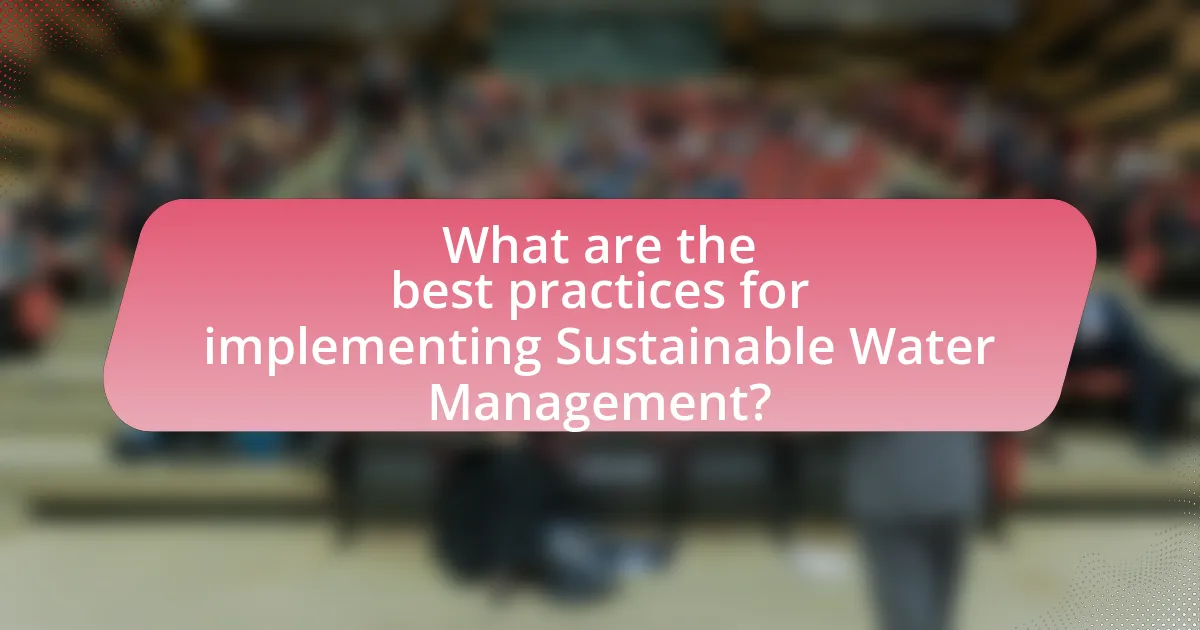
What are the best practices for implementing Sustainable Water Management?
The best practices for implementing Sustainable Water Management include adopting integrated water resource management (IWRM), promoting water conservation techniques, and utilizing advanced irrigation technologies. IWRM facilitates the coordinated development and management of water, land, and related resources, ensuring sustainability and equitable access. Water conservation techniques, such as rainwater harvesting and greywater reuse, significantly reduce water waste and enhance supply resilience. Advanced irrigation technologies, like drip irrigation and soil moisture sensors, optimize water use efficiency, leading to reduced consumption and improved crop yields. These practices are supported by evidence from various agricultural studies, which demonstrate that implementing IWRM can lead to a 20-30% increase in water efficiency and a significant reduction in water-related conflicts.
What steps can farmers take to adopt these practices effectively?
Farmers can adopt sustainable water management practices effectively by implementing specific strategies such as utilizing rainwater harvesting systems, adopting drip irrigation, and employing soil moisture monitoring technologies. These methods enhance water efficiency and reduce waste. For instance, rainwater harvesting can capture and store precipitation for irrigation, significantly decreasing reliance on groundwater. Drip irrigation delivers water directly to plant roots, minimizing evaporation and runoff, which can lead to water savings of up to 60% compared to traditional irrigation methods. Additionally, soil moisture monitoring allows farmers to apply water only when necessary, optimizing usage and improving crop yields. These practices have been endorsed by agricultural experts and demonstrated in various studies, highlighting their effectiveness in promoting sustainable water use in farming.
How can farmers assess their current water management strategies?
Farmers can assess their current water management strategies by conducting a comprehensive evaluation of their irrigation practices, water usage efficiency, and soil moisture levels. This assessment involves analyzing data from soil moisture sensors, evaluating crop water requirements, and reviewing historical water usage records to identify patterns and inefficiencies. Research indicates that implementing precision agriculture techniques can enhance water management by optimizing irrigation schedules based on real-time data, leading to improved crop yields and reduced water waste. For example, a study published in the journal “Agricultural Water Management” found that farms utilizing advanced irrigation technologies reduced water usage by up to 30% while maintaining crop productivity.
What resources are available for farmers seeking to improve their practices?
Farmers seeking to improve their practices can access various resources, including agricultural extension services, online platforms, and workshops. Agricultural extension services provide tailored advice and support, helping farmers implement sustainable practices effectively. Online platforms, such as the USDA’s Sustainable Agriculture Research and Education program, offer research-based information and best practices. Workshops and conferences, like those focused on sustainable water management, facilitate knowledge sharing among farmers and experts, enhancing their understanding of innovative techniques. These resources collectively empower farmers to adopt improved practices that promote sustainability and efficiency in agriculture.
What common pitfalls should be avoided in Sustainable Water Management?
Common pitfalls to avoid in Sustainable Water Management include inadequate stakeholder engagement, lack of integrated planning, and failure to consider local context. Inadequate stakeholder engagement can lead to resistance and ineffective implementation, as seen in various projects where community input was overlooked, resulting in unsustainable practices. Lack of integrated planning often results in fragmented approaches that do not address the interconnectedness of water systems, which can exacerbate water scarcity and pollution. Additionally, failing to consider local context, such as climate variability and socio-economic conditions, can lead to solutions that are not viable or effective, as evidenced by initiatives that did not account for regional water availability and usage patterns.
How can farmers identify and mitigate these pitfalls?
Farmers can identify and mitigate pitfalls in sustainable water management by conducting regular assessments of their water usage and soil moisture levels. Utilizing tools such as soil moisture sensors and water management software allows farmers to monitor their resources effectively, leading to informed decisions. Research indicates that implementing precision irrigation techniques can reduce water waste by up to 30%, demonstrating the effectiveness of targeted water application. Additionally, attending agricultural conferences provides farmers with access to the latest research and best practices, enabling them to adopt innovative strategies for water conservation and management.
What role does community engagement play in successful water management?
Community engagement is crucial for successful water management as it fosters collaboration, enhances local knowledge, and ensures that the needs and values of the community are integrated into water management strategies. Engaging communities leads to better decision-making processes, as local stakeholders often possess valuable insights about their water resources and usage patterns. Research indicates that projects involving community participation are more likely to achieve sustainability goals; for instance, a study published in the Journal of Water Resources Planning and Management found that community-driven initiatives resulted in a 30% increase in water conservation efforts compared to top-down approaches. This evidence underscores the importance of involving communities in water management to create effective and sustainable solutions.
What practical tips can enhance Sustainable Water Management Practices?
Implementing rainwater harvesting systems can significantly enhance sustainable water management practices. These systems capture and store rainwater for various uses, reducing reliance on traditional water sources. According to the United Nations, rainwater harvesting can provide up to 50% of the water needs for households in arid regions, demonstrating its effectiveness in water conservation. Additionally, adopting drip irrigation techniques minimizes water wastage by delivering water directly to plant roots, which can reduce water usage by up to 60% compared to traditional irrigation methods. Furthermore, promoting the use of native plants in landscaping can decrease the need for irrigation, as these plants are adapted to local climate conditions. These practical tips collectively contribute to more efficient water management and conservation efforts.

